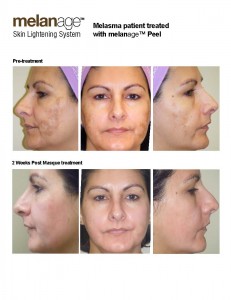 Melasma, commonly replacement therapy/contraceptives or as a reaction to medications or cosmetics. Melanocytes, pigment producing cells in the skin, are stimulated by estrogen and progesterone to produce pigment in response to sun exposure. Less commonly, men can also develop Melasma. The condition occasionally improves after pregnancy in women. There are two primary forms of Melasma, epidermal and dermal. The epidermal form of Melasma is more superficial in the skin, can be diagnosed with special lighting, and is more responsive to treatment. The dermal form of melisma is deeper in the skin and more resistant to treatment.
Melasma, commonly replacement therapy/contraceptives or as a reaction to medications or cosmetics. Melanocytes, pigment producing cells in the skin, are stimulated by estrogen and progesterone to produce pigment in response to sun exposure. Less commonly, men can also develop Melasma. The condition occasionally improves after pregnancy in women. There are two primary forms of Melasma, epidermal and dermal. The epidermal form of Melasma is more superficial in the skin, can be diagnosed with special lighting, and is more responsive to treatment. The dermal form of melisma is deeper in the skin and more resistant to treatment.
The management of Melasma includes preventive measures such as limiting sun exposure from 10:00 A.M. to 2:00 P.M., wearing a wide brimmed hat, and applying sunscreen with an SPF of 30 or greater. Sunscreen requires re-application every 3-4 hours or sooner if you are sweating or swimming. Your sunscreen should include zinc oxide, titanium dioxide or avobenzone (parsol 1789) to block both UVA and UVB rays. Corrective measures include using bleaching creams such as hydroquinone, arbutase, azaleic acid or kojic acid. Tretinoin, chemical peels and microdermabrasion can help with exfoliation. Combination medicines, such as Triluma®, which includes tretinoin, hydroquinone and a steroid, can be convenient and effective. Prescription strength skin care systems such as Obagi Nuderm® can also be helpful in some patients. Certain types of lasers such as Sciton’s ProFractional Erbium, MicroLaser Peel, or Broad Band Light can be effective in some forms of Melasma but they can also worsen the condition in others.
If conservative topical measures are not effective, then more definitive treatment may be required such as pigment removing chemical peels such as the Melanage® Peel. This peel combines tretinoin and arbutase to synergistically clear existing pigment and suppress pigment producing cells. It is typically followed by a maintenance cream of similar ingredients at a lower dose and the preventive measures listed above. While Melasma is a vexing, chronic condition without a cure, it can be effectively managed with an organized approach to skin care.

George Bitar, MD, FACS is an award-winning, board-certified cosmetic and reconstructive plastic surgeon, the Founder and Medical Director of Bitar Cosmetic Surgery Institute in Virginia. He specializes in the latest surgical and minimally invasive techniques to scar management and reduction. Dr. Bitar is involved in groundbreaking research and education in plastic surgery and has authored numerous articles, abstracts, and chapters.





